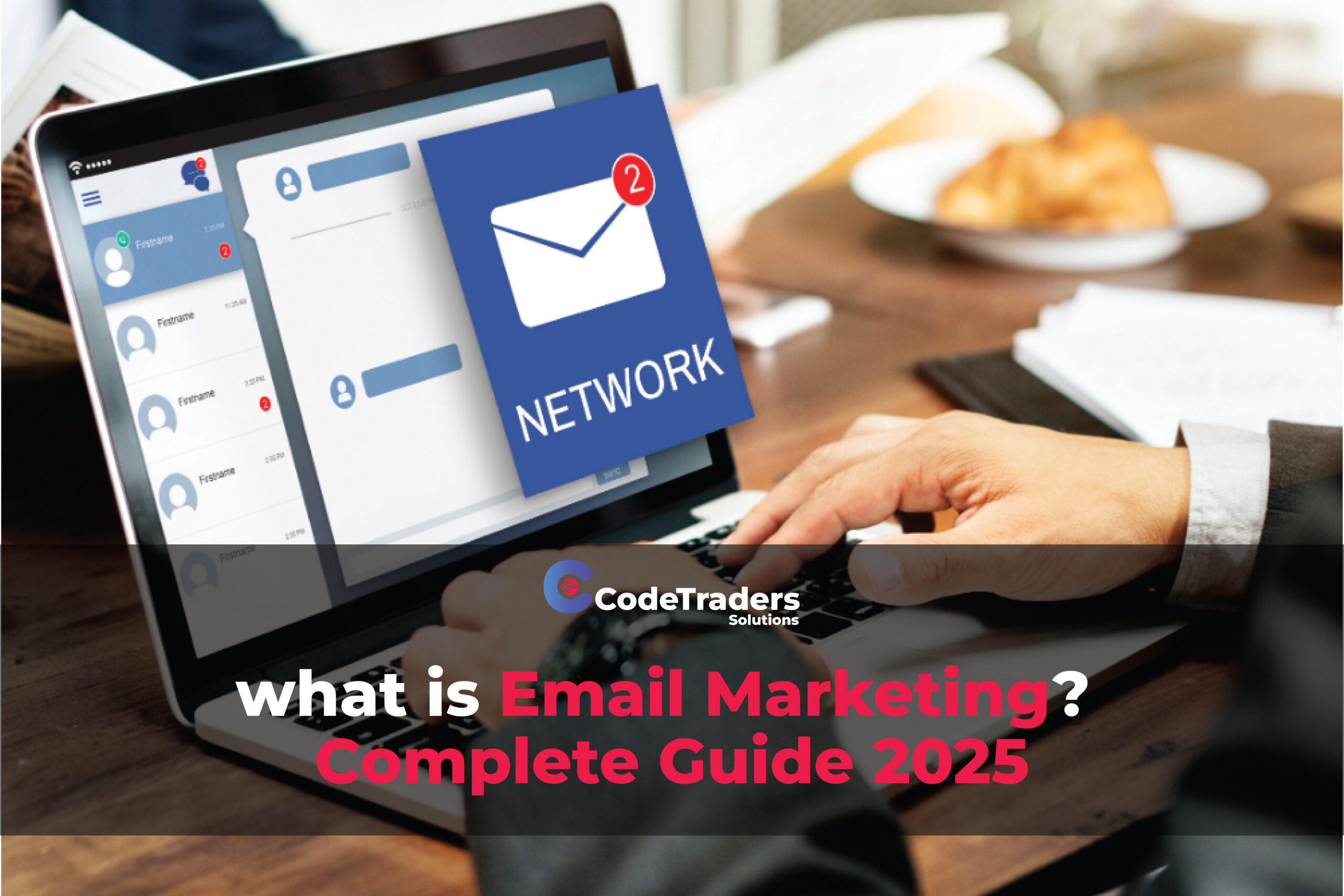Definition of Email Marketing
Email marketing is a digital strategy that involves sending targeted emails to individuals or groups to promote products, services, or build lasting customer relationships. It’s a personalized and direct communication method designed to inform, engage, and drive action from recipients.
How Email Marketing Works
The process begins with building an email list of subscribers who have shown interest in your business. Marketers then craft tailored messages, such as promotional offers, newsletters, or product updates, to meet the specific needs of their audience. These emails are delivered through email marketing platforms that allow tracking metrics like open rates, clicks, and conversions to measure success.
Comparison to Other Marketing Channels
Unlike social media or paid ads, email marketing offers a more personal and focused approach. It ensures direct communication without algorithm interference, making it highly effective for delivering consistent and impactful messages straight to the recipient’s inbox.
2. Importance of Email Marketing in 2025
Personalized Communication in a Privacy-Focused Era
As privacy concerns grow, consumers increasingly expect tailored experiences without sacrificing their data. Email marketing allows businesses to deliver highly personalized content based on user preferences and behavior, making it a trusted channel in this privacy-conscious age.
High ROI: Case Studies and Statistics
Email marketing continues to deliver exceptional returns. According to recent studies, businesses earn an average of $36 for every $1 spent on email campaigns. Case studies from brands like Amazon and Airbnb highlight how targeted emails drive engagement, sales, and customer loyalty.
Role in Omnichannel Strategies
Email marketing seamlessly integrates with other channels, such as social media and e-commerce platforms, to create unified customer experiences. It serves as the glue that connects these channels, ensuring consistent messaging.
Growing Reliance on Email
Email remains the most direct and professional communication tool for businesses. In 2025, its role is expanding as more organizations use it to build trust and maintain meaningful connections with their audience.
3. Key Components of an Effective Email Marketing Strategy
Audience Segmentation
Segmentation is crucial for tailoring your messages to specific groups. By analyzing data like demographics, behavior, and preferences, you can create focused campaigns that resonate. Techniques include segmenting by purchase history, engagement levels, or geographic location, ensuring your emails meet the unique needs of each audience.
Content Creation
Effective content starts with an engaging subject line that grabs attention. Your email copy should be clear, persuasive, and concise, with a tone matching your brand’s voice. Visuals and multimedia, like images, videos, or GIFs, enhance engagement and make your message more appealing.
Call to Action (CTA)
A strong CTA directs recipients toward a desired action. Use clear, actionable phrases like “Shop Now” or “Learn More.” In 2025, interactive CTAs, such as embedded surveys or buttons, are increasingly popular.
Timing and Frequency
Consistency is key, but overloading your audience can lead to unsubscribes. Analyze engagement data to find the ideal time and frequency for sending emails.
Personalization and Automation
AI-driven personalization enhances relevance by delivering content based on recipient behavior. Automated workflows nurture leads efficiently, such as sending welcome emails or follow-ups, creating a seamless and effective email journey.
4. Types of Email Marketing Campaigns
Welcome Emails
Welcome emails are your first touchpoint with subscribers, making a lasting impression. They set expectations, introduce your brand, and build trust from the start.
Promotional Emails
These emails showcase discounts, product launches, or seasonal offers. Their goal is to drive sales and create excitement around new or existing products.
Newsletter Emails
Newsletters share updates, industry insights, and valuable content. They focus on building long-term relationships and keeping your audience engaged.
Transactional Emails
These include order confirmations, shipping updates, and receipts. Transactional emails are essential for enhancing the customer experience with timely, informative communication.
Re-engagement Emails
Designed to reconnect with inactive subscribers, re-engagement emails include strategies like personalized offers, feedback requests, or reminders to renew interest in your brand.
5. Tools and Platforms for Email Marketing
Overview of Popular Email Marketing Tools
There are numerous platforms designed to streamline email marketing. Tools like Mailchimp, HubSpot, and ActiveCampaign offer features for campaign creation, automation, and audience management, making them ideal for businesses of all sizes.
Features to Look For in Email Marketing Software
Key features include easy-to-use templates, advanced segmentation, automation workflows, personalization capabilities, and CRM integration. A user-friendly dashboard and robust analytics are essential for performance tracking.
Role of Analytics and A/B Testing
Analytics help measure open rates, click-through rates, and conversions. A/B testing allows marketers to experiment with subject lines, content, and visuals to identify what resonates best with their audience, improving overall campaign effectiveness.
5. Compliance and Best Practices
Importance of Data Privacy Laws
Data privacy laws like GDPR (Europe) and CCPA (California) safeguard user information. In 2025, adhering to these regulations is critical to avoid penalties and build trust with your audience.
How to Ensure Compliance with Anti-Spam Laws
Follow anti-spam guidelines like the CAN-SPAM Act by including clear opt-out options, accurate sender information, and avoiding misleading subject lines.
Building a Permission-Based Email List
Always obtain explicit consent before emailing. Use opt-in forms and double confirmation to ensure compliance and maintain a high-quality list.
Ethical Considerations in Email Marketing
Respect user preferences, avoid buying email lists, and prioritize transparency. Ethical practices foster trust, improve engagement, and protect your brand reputation.
6. Trends and Innovations in Email Marketing (2025)
Rise of AI-Generated Content and Dynamic Personalization
AI tools now create tailored email content in seconds, analyzing behavior and preferences to deliver hyper-personalized experiences that drive engagement.
Enhanced Email Interactivity
Technologies like AMP for Email enable interactive features such as surveys, carousels, and live updates. Gamification elements, like spin-to-win or quizzes, make emails more engaging and fun.
Voice Search Optimization for Email Content
With the rise of voice assistants, optimizing email subject lines and content for voice search ensures accessibility and keeps brands ahead of evolving user habits.
Integration with Other Technologies
Email marketing integrates seamlessly with CRMs, IoT devices, and e-commerce platforms, enabling automated workflows, smarter targeting, and synchronized communication across channels.
7. How to Get Started with Email Marketing
Building Your First Email List: Tips and Techniques
Start by offering value, such as discounts, free resources, or exclusive updates, to encourage people to subscribe. Use opt-in forms on your website, landing pages, and social media to grow your list organically. Always prioritize quality over quantity by ensuring permission-based sign-ups.
Creating a Roadmap for Your Campaigns
Plan your campaigns with clear goals: define your audience, craft engaging content, and schedule emails for optimal times. Outline key milestones like welcome emails, promotions, and follow-ups to build consistency.
Resources for Learning More
Leverage educational blogs like HubSpot or Mailchimp, take courses on platforms like Udemy, and explore email marketing tools offering free tutorials to sharpen your skills and improve performance.
Conclusion
Email marketing continues to be a cornerstone of digital marketing in 2025, offering businesses a direct, effective, and personalized way to connect with their audience. Its ability to deliver exceptional ROI, adapt to emerging trends like AI-driven personalization and interactivity, and align with privacy-focused strategies makes it indispensable. By fostering relationships, driving conversions, and providing valuable content, email marketing consistently delivers measurable results. Whether you’re a beginner or a seasoned marketer, now is the perfect time to start leveraging its potential.
FAQs Email Marketing
FAQs Email Marketing
Email Marketing remains one of the most effective digital marketing strategies in 2025. With advancements in AI-driven personalization, automation, and interactive email design, businesses achieve higher engagement and ROI. Statistics show email marketing delivers an average ROI of $36 for every $1 spent.
The top trends include AI-generated content, dynamic personalization, AMP for interactive emails, and voice search optimization. Integration with CRMs and IoT also enhances targeting and performance.
To boost open rates, use personalized subject lines, segment your audience, and send emails at optimal times. Testing with AI tools and analyzing data helps identify what resonates best.
AI enhances email marketing by automating content creation, predicting user behavior, and personalizing campaigns. It helps send tailored messages at the right time, increasing engagement and conversions.

